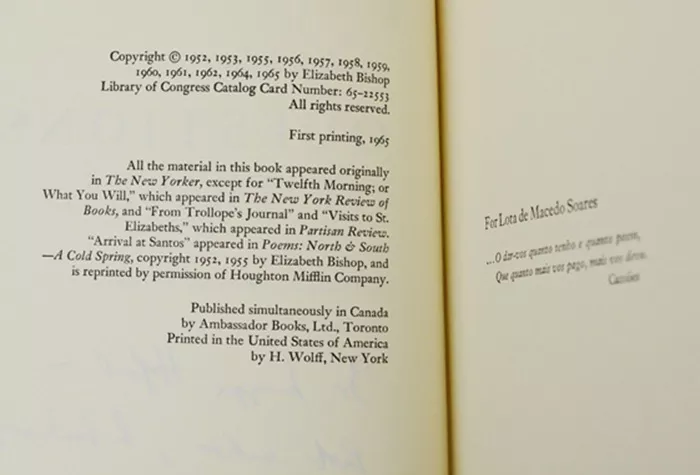Welcome to Poem of the Day – Questions of Travel by Elizabeth Bishop
Elizabeth Bishop’s poem Questions of Travel presents a meditative exploration of travel, both literal and metaphorical, and delves into the questions that arise when one journeys to new places. This poem speaks to the idea of travel as a way of seeking knowledge, while also questioning its value, its impact on both the traveler and the places visited. Through her keen observations and precise language, Bishop asks profound questions that touch on the human condition and our relationship with the world.
Questions of Travel Explanation
Summary of the Poem
In Questions of Travel, Bishop reflects on the experience of traveling, particularly to foreign lands. The poem begins with a series of rhetorical questions, where the speaker wonders whether it is better to stay in one’s familiar surroundings or to venture out into unknown territories. Throughout the poem, the speaker challenges the idea that travel is inherently beneficial or enlightening. The poem captures the tension between the desire for exploration and the sense of uncertainty and disorientation that travel can bring. Bishop uses travel as a metaphor for the larger human experience of seeking meaning and purpose, while also confronting the complexities of the world.
Exploring the Theme of Travel
Bishop’s poem begins by raising questions about the purpose and significance of travel. She asks, “Should we have stayed at home and thought of here?” implying that perhaps it would be wiser to remain in one’s comfort zone rather than travel to unknown places. She explores the tension between the excitement of discovery and the sense of alienation that comes with being far from home. This tension suggests that travel can be both a source of growth and a source of discomfort.
The speaker also questions whether the experiences gained through travel can truly be meaningful. While the traveler might encounter new landscapes and cultures, the poem suggests that these experiences may ultimately leave one unchanged. The repeated questioning throughout the poem reflects a sense of uncertainty and doubt, forcing the reader to consider whether the act of travel can ever provide the fulfillment it promises.
Imagery and Symbolism in the Poem
Bishop’s use of imagery is one of the poem’s most striking features. She paints vivid pictures of various landscapes and people encountered during travel, such as “the steep hills,” “the people who cross the street,” and “the strange flowers.” These images evoke the beauty and strangeness of the foreign world, yet they also underline the distance and alienation felt by the traveler. The imagery contrasts the alluring and unfamiliar elements of travel with the disorienting experience of being a stranger in a new place.
The poem’s focus on nature is also significant. Bishop often references natural elements, such as “birds” and “the sea,” to symbolize the forces of change and transformation. These natural symbols suggest that travel, much like nature, is a powerful force that can shape a person’s identity and understanding of the world.
The Structure of the Poem
Questions of Travel is composed of several stanzas of varying lengths. The poem’s form reflects the speaker’s internal journey as she moves from question to question, contemplating the consequences of travel. The lack of a strict rhyme or meter mirrors the uncertainty expressed in the poem. This loose structure emphasizes the sense of ambiguity and openness that pervades the speaker’s musings.
Bishop’s use of enjambment—where a sentence or thought continues beyond the end of a line—mirrors the fluidity of the travel experience. The lack of clear boundaries between lines allows the poem’s meaning to unfold slowly, much like the process of travel itself, which is often uncertain and unpredictable.
Themes of Home and Displacement
A key theme in Questions of Travel is the idea of home. The poem opens with the suggestion that one might be better off staying home rather than embarking on a journey to foreign lands. The concept of home is central to Bishop’s exploration of travel, as it represents familiarity, comfort, and a sense of belonging. Yet, by the end of the poem, the speaker seems to conclude that the act of traveling—while often challenging and disorienting—can ultimately lead to new insights about one’s home and identity.
Bishop uses travel as a metaphor for the internal journey we all undergo when seeking knowledge or meaning. Just as the traveler must confront new landscapes and cultures, so too must individuals confront their own inner landscapes and ideas about the world. Travel, in this sense, becomes a way of questioning one’s own beliefs, assumptions, and desires.
Conclusion
Elizabeth Bishop’s Questions of Travel is a thoughtful meditation on the complexities of travel, identity, and the search for meaning. Through its series of rhetorical questions, vivid imagery, and exploration of home and displacement, the poem invites readers to reflect on the deeper implications of travel. Is it worth the discomfort and disorientation? Does travel truly offer any lasting insight? Ultimately, Bishop leaves these questions unanswered, encouraging the reader to ponder the value of their own journeys—both physical and emotional.


